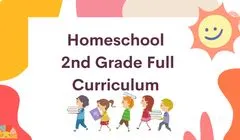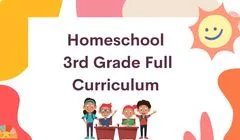When your child starts using words like "analyze," "perspective," or "hypothesis" in conversation, it shows they’re thinking more critically and expressing themselves with confidence. Vocabulary growth in sixth grade is especially important as students move from learning to read toward reading to learn, navigating more complex texts across science, history, math, and literature.
The good news is that building vocabulary words for 6th graders doesn’t have to rely on rote memorization. Meaningful practice happens through family conversations, projects, and interactive games that connect words to real experiences. This guide shares key vocabulary, simple strategies, and creative activities to make learning fun, along with flexible resources like Outschool that bring new words to life in engaging ways.
Why vocabulary matters in 6th grade
6th grade is a turning point for homeschoolers. Learners begin reading more complex texts across science, history, math, and literature, which makes vocabulary an essential tool. A strong vocabulary allows children to approach challenging materials with confidence, explain their ideas clearly, and build the communication skills they’ll need for higher grades and beyond.
Here’s why vocabulary deserves special focus in 6th grade homeschooling:
- Supports independent reading: A rich word bank helps your child understand advanced texts without constant frustration or interruptions.
- Strengthens writing and expression: Precise words allow homeschooled learners to share their thoughts clearly in journals, essays, and family discussions.
- Bridges learning stages: Sixth grade moves children from basic language skills to the subject-specific terms they’ll encounter in middle and high school.
- Encourages critical thinking: The right vocabulary helps children analyze, compare, and evaluate ideas in projects, conversations, and discussions.
- Predicts future success: Research shows early word knowledge is linked to stronger reading comprehension and better academic performance in later grades.
As a homeschooling parent, you become the mentor guiding this growth. Instead of relying on worksheets or spelling lists alone, you can weave vocabulary practice into conversations, shared reading, and hands-on projects. By making word learning part of your daily homeschool routine, you help your child develop lasting language skills that go beyond memorization and prepare them for lifelong learning.
Essential vocabulary words every 6th grader should know
Deciding which vocabulary words a 6th grader should master becomes easier when you focus on high-impact terms that show up across subjects and in real-life situations. Choosing strategically helps strengthen comprehension, supports better performance in academics, and builds confidence in everyday communication.
Here are key areas to focus on:
- Foundational terms: Words like "analyze," "evidence," "hypothesis," "influence," "narrative," "summarize," "variable," "perspective," "relevant," and "contrast" appear often in science, history, and literature.
- Cross-curricular critical thinking words: Terms such as "compare," "interpret," "conclude," and "evaluate" help learners tackle math word problems, science observations, and social studies research.
- High-frequency academic words: Words like "abundant," "clarify," "demonstrate," and "significant" strengthen both comprehension and communication.
- Context-rich practice: Encourage your child to use each new word in three ways once in an academic setting, once in conversation, and once creatively to deepen retention.
- Word families and roots: Exploring roots such as spect ("perspective," "inspect," "respect") or struct ("construct," "instruct," "structure") helps children decode related terms in advanced texts.
- Personal connections: Blend academic words with specialized terms from your child’s hobbies or passions to make vocabulary learning more meaningful and memorable.
Best ways to teach vocabulary at home
The best way to teach vocabulary words to 6th graders at home is to create meaningful connections rather than rely on memorization. Multi-sensory activities help learners understand and remember new terms. Encourage your child to:
- Draw or act out meanings to bring words to life.
- Build word maps that connect terms to familiar ideas, personal experiences, or related words.
- Play word games like Riddle Me This, where they write clues and others guess the vocabulary word.
Consistency matters more than cramming. Instead of long flashcard sessions, weave vocabulary into everyday routines. Try:
- Talking about new words during dinner or errands.
- Reading aloud together and pausing to discuss interesting terms.
- Revisiting words in short, repeated bursts throughout the week.
Personalization makes vocabulary feel exciting rather than like a chore. Connect word lists to your child’s interests:
- An animal lover can learn terms like "habitat" and "adaptation."
- A budding artist might explore "composition," "perspective," and "technique."
- Rotate approaches with journals, detective-style challenges, or storytelling games where new words become characters.
When vocabulary connects to daily life and personal passions, homeschoolers build skills that stick and stay motivated to keep learning.
Making vocabulary learning fun and real-world
Learning becomes memorable when you weave new words into everyday adventures and creative play. Since learners need to encounter a word between 6 and 30 times to truly master it, finding enjoyable ways to practice becomes your secret weapon.
- Turn riddle-making into a family game night where kids craft clues for new words and everyone competes to guess correctly, transforming your home into an engaging word-learning space
- Hunt for words during real-world outings by challenging learners to spot examples of their study terms at grocery stores, parks, or museums, then use them in conversations with cashiers or park rangers
- Weave new language into meaningful projects like writing thank-you cards to teachers, creating neighborhood flyers for lost pets, or crafting detailed trip reports for your homeschool portfolio
- Start daily word traditions where everyone incorporates the chosen term into natural conversations during meals, car rides, and bedtime stories
- Encourage authentic writing practice through emails to relatives, product reviews for recent purchases, or creative captions that showcase expanding language skills
- Transform routine moments into learning opportunities by narrating cooking steps with precise terms, describing errands using rich language, or playing word games during waiting times
Frequently asked questions about 6th grade vocabulary
Homeschooling parents often have practical questions about building their child's vocabulary skills effectively. These answers address the most common concerns and help you create a confident approach to language learning at home.
How many vocabulary words should my 6th grader learn each week?
Focus on introducing 5-8 new words per week, building toward a foundation of 30-40 words over several months. Research shows that students need multiple exposures to fully learn new words, which is why consistent review matters more than rushing through large lists. Adapt your pace based on your child's learning style and interests. Some learners thrive with fewer words studied deeply, while others enjoy tackling a greater variety.
What should I do if my child struggles to remember new vocabulary words?
Use games, real-life examples, and gentle repetition to build confidence rather than increasing pressure. Explicit instruction with easy-to-understand definitions, examples, and regular check-ins proves highly effective for vocabulary retention. Create visual representations, act out word meanings, or connect new terms to your child's hobbies and experiences to make learning stick.
How often should we review vocabulary words at home?
Review new words several times throughout the week in short, focused 10-15 minute sessions rather than concentrating all practice into one lengthy study period. Spacing out practice helps move words from short-term to long-term memory more effectively. Mix review methods—use the words in conversation during dinner, play quick matching games, or have your learner teach the words back to you.
Are there good online tools to help with 6th grade vocabulary practice?
Online classes like Outschool provide structured vocabulary instruction with expert teachers who make learning interactive and fun. Look for programs that combine visual elements, games, and real-world applications to keep your learner motivated.
Should I stick to grade-level word lists or customize based on my child's interests?
It’s best to blend both. Start with core academic vocabulary, since those words build the foundation for success across subjects. Then, add terms connected to your child’s passions, whether that’s astronomy, cooking, or graphic novels. When vocabulary feels relevant to what they already love, motivation and retention naturally increase. A good balance is about 70% academic words and 30% interest-based words, giving your learner the structure they need while keeping learning fun and meaningful.
Create confident readers and writers through vocabulary
Helping your 6th grader strengthen vocabulary doesn’t have to feel overwhelming. With the right approach, word learning becomes an adventure through strategies like word maps, storytelling games, and field trip discoveries. As a homeschooling parent, you can create a learning environment where words come alive in conversations, projects, and daily experiences. These moments build the language confidence children need for academic success and self-expression.
Outschool offers flexible options to support your family’s vocabulary journey. With a wide range of subjects and vocabulary classes to strengthen communication skills, you can make word learning a lasting part of your homeschool routine.


.svg)
.svg)





.webp)


.webp)











.webp)



